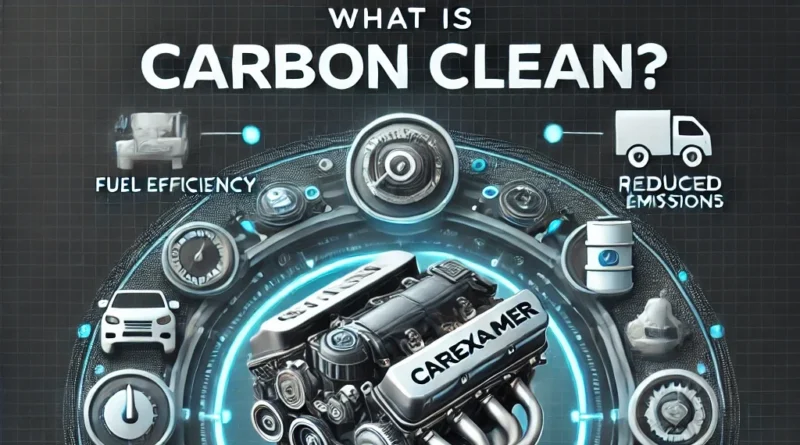What is Carbon Clean? Guide to Understanding Carbon Cleaning
But what exactly is carbon clean, and why is it so important? This article will delve into the concept of carbon cleaning, its benefits, and its applications across different sectors. In recent years, as the world has become more conscious of environmental sustainability, carbon cleaning has emerged as a critical technology in various industries. From automotive maintenance to industrial applications, carbon cleaning plays a vital role in reducing emissions, improving efficiency, and extending the lifespan of machinery.
What is Carbon Clean?
Carbon cleaning, often referred to as carbon clean, is the process of removing carbon deposits from internal combustion engines, industrial machinery, and other equipment that rely on fossil fuels. Over time, the burning of fuel in engines and machines leads to the accumulation of carbon deposits on engine components such as valves, pistons, and injectors. These deposits can significantly affect the performance of the engine, causing issues like reduced fuel efficiency, increased emissions, and even engine failure.
The process of carbon cleaning involves using specialized equipment and techniques to safely and effectively remove these carbon deposits. The result is a cleaner, more efficient engine or machine that operates closer to its original performance specifications.
How Does Carbon Cleaning Work?
Carbon cleaning can be achieved through various methods, each suited to different types of engines and machinery:
- Hydrogen Carbon Cleaning: This method uses a mixture of hydrogen and oxygen gases introduced into the engine’s air intake. When the engine is running, this mixture helps to burn off the carbon deposits, turning them into water vapor and carbon dioxide, which are then expelled through the exhaust. Hydrogen carbon cleaning is popular in automotive applications due to its effectiveness and non-invasive nature.
- Chemical Carbon Cleaning: In this method, a chemical solution is introduced into the engine or machinery to dissolve the carbon deposits. The solution is typically flushed out after the process, along with the dissolved carbon. This method is often used in industrial settings where heavier machinery requires a more robust approach.
- Mechanical Carbon Cleaning: Mechanical carbon cleaning involves physically scraping or blasting away carbon deposits using tools like brushes, scrapers, or abrasive media. This method is more labor-intensive and is usually reserved for situations where chemical or hydrogen cleaning methods are insufficient.
Benefits of Carbon Cleaning
- Improved Fuel Efficiency: One of the most immediate benefits of carbon cleaning is improved fuel efficiency. Clean engines burn fuel more effectively, which can lead to significant savings in fuel costs over time.
- Reduced Emissions: By removing carbon deposits, carbon cleaning helps reduce the amount of harmful emissions released into the environment. This is particularly important in industries and regions with strict emission regulations.
- Enhanced Performance: Engines and machinery that undergo regular carbon cleaning tend to operate more smoothly and with greater power, as they are free from the performance-hindering effects of carbon buildup.
- Extended Engine Lifespan: Regular carbon cleaning can extend the life of engines and machinery by preventing the wear and tear that carbon deposits can cause over time. This can result in lower maintenance costs and fewer breakdowns.
Applications of Carbon Cleaning
Carbon cleaning is used in a wide range of applications across various industries:
- Automotive Industry: Carbon cleaning is commonly used in cars, trucks, and motorcycles to maintain engine performance and efficiency. It is often recommended as part of regular vehicle maintenance.
- Industrial Machinery: In industries such as manufacturing, construction, and power generation, carbon cleaning is essential for maintaining the efficiency of large engines and machinery.
- Marine and Aviation: Ships, boats, and aircraft also benefit from carbon cleaning to ensure optimal performance and compliance with emission standards.
Is Carbon Cleaning Necessary?
While not always required, carbon cleaning is highly recommended for engines and machinery that have accumulated significant hours of operation. Over time, even the most well-maintained engines can develop carbon deposits, which can lead to performance issues if left untreated. For vehicles, regular carbon cleaning can be part of a preventive maintenance routine, ensuring that the engine remains efficient and reliable.
Conclusion
Carbon cleaning is a crucial process for maintaining the performance, efficiency, and longevity of engines and machinery that rely on fossil fuels. Whether in automotive, industrial, or other applications, carbon cleaning helps reduce emissions, improve fuel efficiency, and extend the life of expensive equipment. As environmental concerns continue to drive the need for cleaner, more efficient technologies, carbon cleaning will likely become an even more important practice in the years to come.
By understanding what carbon cleaning is and its benefits, individuals and businesses can make informed decisions about incorporating this essential maintenance practice into their operations.
Buying a used VW. Buying used vauxhall, BMW, Jaguar, Ford, Volvo, Range rover, Bentley, Aston Martin, Porsche, Ferrari, Lamborghini, Maserati, Hyundai, Tesla, Honda, Pagani

